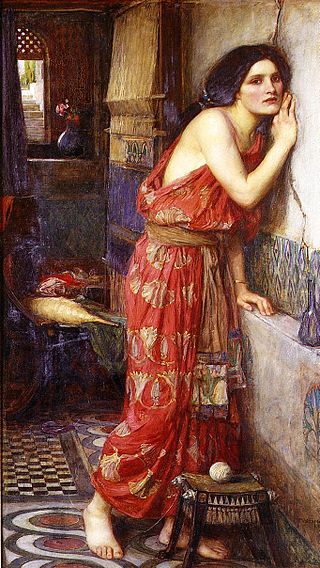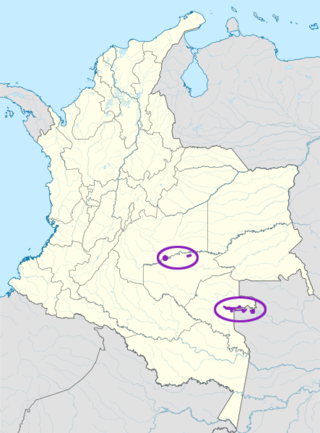
In classical Greek mythology, Syrinx was an Arcadian nymph and a follower of Artemis, known for her chastity. Being pursued by Pan, she fled into the river Ladon, and at her own request was metamorphosed into a reed from which Pan then made his panpipes.

In Greek mythology, maenads were the female followers of Dionysus and the most significant members of his retinue, the thiasus. Their name, which comes from μαίνομαι, literally translates as 'raving ones'. Maenads were known as Bassarids, Bacchae, or Bacchantes in Roman mythology after the penchant of the equivalent Roman god, Bacchus, to wear a bassaris or fox skin.

In Greek mythology, Pyramus and Thisbe are a pair of ill-fated lovers from Babylon, whose story is best known from Ovid's narrative poem Metamorphoses. The tragic myth has been retold by many authors.

The piccolo is a half-size flute and a member of the woodwind family of musical instruments. Sometimes referred to as a "baby flute" or piccolo flute, the modern piccolo has the same type of fingerings as the standard transverse flute, but the sound it produces is an octave higher. This has given rise to the name ottavino, by which the instrument is called in Italian and thus also in scores of Italian composers.
Uakti may refer to:
Matthias Ziegler is a Swiss flautist and professor of flute who specializes in contemporary music for various sizes of flute.

Uakti (WAHK-chee) was a Brazilian instrumental musical group that was composed of Marco Antônio Guimarães, Artur Andrés Ribeiro, Paulo Sérgio Santos, and Décio Ramos. Uakti was known for using custom-made instruments, built by the group itself.
The Native American flute is a musical instrument and flute that is held in front of the player, has open finger holes, and has two chambers: one for collecting the breath of the player and a second chamber which creates sound. The player breathes into one end of the flute without the need for an embouchure. A block on the outside of the instrument directs the player's breath from the first chamber—called the slow air chamber—into the second chamber—called the sound chamber. The design of a sound hole at the proximal end of the sound chamber causes air from the player's breath to vibrate. This vibration causes a steady resonance of air pressure in the sound chamber that creates sound.

Tucano, also Tukano or Tucana, endonym ye’pâ-masa yee uúku͂sehé, is a Tucanoan language spoken in Amazonas, Brazil and Colombia.

The Hupda are an Amazonian indigenous people who live in Brazil and Colombia. They speak the Hup language.

The Tucano people (In Tucano: ye’pâ-masɨ, ye’pâ-maso, ye’pâ-masa ), are a group of Indigenous South Americans in the northwestern Amazon, along the Vaupés River and the surrounding area. They are mostly in Colombia, but some are in Brazil. They are usually described as being made up of many separate tribes, but that oversimplifies the social and linguistic structure of the region.
The Cubeo are an ethnic group of the Vaupés Department (Colombia). Cubeo is a generic name that is used in local Spanish and appears in the literature in reference to a social and linguistic group. Although the term does not have any meaning in their language, the Cubeo refer to themselves by that name in interactions with others. There is no common native name, aside from referring to themselves as "people" (pâmiwâ) or, more precisely, "my people" (jiwa). An individual's social identification is based on his or her adscription to a mythical clan forebear whose name is used as an eponym.
Barasana (alternate names Barazana, Panenua, Pareroa, or Taiwano is an exonym applied to an Amazonian people, considered distinct from the Taiwano, though the dialect of the latter is almost identical to that of the Barasana, and outside observers can detect only minute differences between the two languages. They are a Tucanoan group located in the eastern part of the Amazon Basin in Vaupés Department in Colombia and Amazonas State in Brazil. As of 2000, there were at least 500 Barasanas in Colombia, although some recent estimates place the figure as high as 1,950. A further 40 live on the Brazilian side, in the municipalities of Japurá and São Gabriel da Cachoeira.

Anton Walter Smetak was a Swiss-born musician, composer, writer, sculptor and producer of musical instruments.

Freitag aus Licht, the main body of which is also titled Freitag-Versuchung, is the fifth to be composed of the seven operas that comprise Licht (Light), by Karlheinz Stockhausen. It was the last of the operas to receive a staged production with the composer's involvement.
Águas da Amazônia, Sete ou oito peças para um balé is a 1993–99 musical composition by the American contemporary classical composer Philip Glass. Its first recording was performed by the Brazilian instrumental group Uakti.

Leda and the Swan is an oil painting by Peter Paul Rubens, who painted two versions of this subject. The first was completed in 1601 and the second in 1602.

It's After the End of the World is a live album by American composer, bandleader and keyboardist Sun Ra recorded in 1970 in Donaueschingen and Berlin and released on the MPS label in 1970. The complete concerts were released in 1998 as a 2-CD set entitled Black Myth/Out in Space.

Black Myth/Out in Space is a 2CD live album by American composer, bandleader and keyboardist Sun Ra recorded in 1970 in Donaueschingen and Berlin and released on the Motor Music label in 1998. Selections from the concerts were originally released in 1970 on MPS Records as It's After the End of the World but the rerelease complies both complete concerts adding more than 75 minutes of previously unissued recordings.

Chaquén was the god of sports and fertility in the religion of the Muisca. The Muisca and their confederation were one of the four advanced civilizations of the Americas and as they were warriors, sports was very important to train the fighters for wars, mainly fought between the zipazgo and the zacazgo but also against other indigenous peoples as the Panches, Muzos and others. When the Spanish arrived in the highlands of central Colombia, the Altiplano Cundiboyacense, they encountered resistance of the guecha warriors, trained by Chaquén.